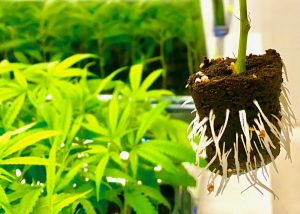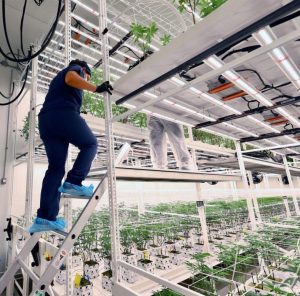An Australian dedicated medicinal cannabis nursery, Standard Botanic, is being launched by Adam Benjamin, one of Australia’s pioneers of medicinal cannabis. Formed about a year ago, the business will supply young clones to licensed cultivators across the country. The clones are taken from Standard Botanic maintained mother stock, raised from its own elite genetics.
Benjamin’s experience as a co-Founder of one of Australia’s first medicinal cannabis cultivation businesses drove him to this new venture, designed to service cultivators. Says Benjamin, “I’ve lived and brea thed the pains of starting a cultivation business over five years, from first seed imports through to products on the dispensary shelves.”
That experience, and a chance meeting two decades ago, inspired the formation of Standard Botanic, on a mission to drive Australian cultivators to the forefront of premium flower supply. “Premium medicinal flower is by far the most profitable crop to grow in all of agriculture. So why are almost all products imported, despite six years and over 90 cultivation licenses being issued?“ asks Benjamin.
“Sourcing the right plant genetics is the missing piece of the puzzle”, continues Benjamin. The mother stock of Standard Botanic offered clones has been developed from seeds preserved over decades by the late Nevil Schoenmakers, one of the pioneers of cannabis genetics. While all cultivators have turned to the same few seed suppliers in Canada and the Netherlands, “…the real question is what are you getting, who do those suppliers turn to?”. According to Benjamin, with only a handful of seeds of landrace strains remaining, Standard Botanic was in a privileged position based on his longstanding connection with Schoenmakers.
“The difference between elite genetics and widely offered genetics can’t be overstated. At it’s extreme, given the reality that variable opex is at least $2 per gram for most operations, it’s the difference between viability and failure given wholesale prices for run of the mill flower. In some cases, this has played out in public, with stories of abandoned cultivation operations or failures to deliver not uncommon. Then there’s profits – premium flower (wholesale) command prices that are a multiple of the price of low quality’ flowers (most likely destined for the extraction market)”, continues Benjamin.
“There are great genetics out there, but given the extreme difference in profitability, there’s small wonder that they’re closely guarded”, says Benjamin. He continues, “the usual process of acquiring seeds is a lottery – you might get a good payoff, but the odds are stacked against you. What’s worse, you only know of the payoff after 1-2 years, all the while stacking up operating losses”.
Benjamin says these timeframes are the typical development cycle to acquire and import seeds, germinate, grow to flower, test, rinse and repeat to validate that the genetics are stable across generations, and ultimately to multiply out plant number of any viable and attractive genetics among the scores of strains tested, to build mother stock to commercial scale. Only then can the cultivator look forward to generating sufficient scale of cuttings, which will produce flowers for harvest some 4 or so months later – if all goes well.
Compounding this uncertainty, dialling in the growing environment and protocols is a real challenge as all strains behave differently to different combinations of inputs and conditions. This is not a secret, some of the ultimately successful cultivators publicly reporting commercial failure of first crops while this process is settled in.
Standard Botanic is scaling up to deliver it’s potential customers thousands of young rooted or unrooted clones each month, all derived from its elite genetics covering a variety of strains – differing profiles of cannabinoids, terpenes and flavonoids.
“Delivering young clones derived from our elite genetics gets cultivators to first harvest of premium flowers in under six months, saving cultivators the enormous cash burn and de-risking development”, stresses Benjamin.
Says Benjamin – “The key markers of potentially profitable genetics are dry flower yield per square metre of plants and for a given set of inputs (light, fertiliser and other options), ease of growing, and cannabinoid potency and profile”. Benjamin continues, “but that’s the starting point. Probably the most overlooked, but ultimately the most critical factor distinguishing elite genetics is profile consistency across generations”. Without stability of the profile patients looking for premium flower will turn away, and consistency requirements for flowers are enshrined in regulations both here and overseas.
Standard Botanic has also spent its time developing optimised growing protocols for its strains for a variety of conditions. Uniquely, these are delivered using its cloud based ‘Standard Grow Platform’. “The platform will provide our cultivator customers with recommended combinations of inputs for all stages of development of the strains, for a variety of environmental and other conditions typical in cultivation operations. We’re with our customers for the whole journey”.
The business model has been designed to share the risks and rewards of the cultivator. Clones are provided under license, and delivered securely across Australia. Standard Botanic charges what Benjamin describes as “modest fees for cuttings delivery, with the bulk of our reward coming from royalties. So we share in our customer’s success, clearly showing our intention that customer relationships will be deep and long-term.”
Benjamin says the business is currently scaling up its operations to be delivery ready for bulk scale clone deliveries later this year, but has commenced supplying small batches of clones and would welcome the opportunity to provide a more detailed introduction to Standard Botanic to PCA members. For more information go to www.standardbotanic.com or email Adam adam@standardbotanic.com




